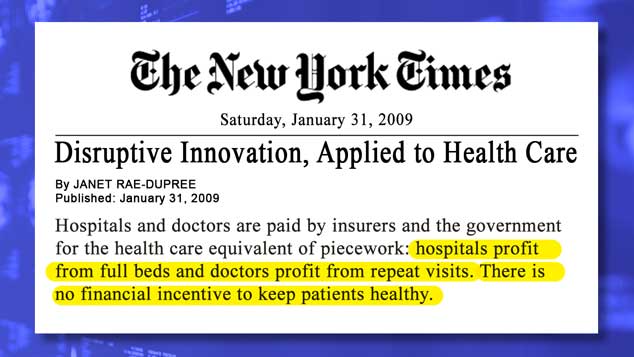Part III. Why Screening Colonoscopy Increases the Risk of Colorectal Cancer
The whole premise of using screening colonoscopy to prevent colon cancer is built around the idea of polypectomy - a medical term for locating and removing precancerous polyps inside the colon, just like explained in this advertorial by “doctor” Couric:
Voice of Katie Couric from March, 2007 video [21]:
“If you can remove the polyp, even before it's cancerous, then you literally nip the disease in the bud.”
But that is not what the polypectomy actually delivers:
- First, an estimated 95% of all polyps are benign, they will never become cancers, so removing them makes just as much sense as zapping the moles off your buttocks to prevent melanoma…
- Second, not all colorectal cancers are preceded by detectable polyps. It is believed an even larger share of colon cancers start from flat lesions that no one is suggesting to remove, even though they are considered five time as cancerous as large polyps....
- Third, removing polyps or even doing biopsies releases cancer cells into the blood stream and the colon's lumen. In turn, these cells may seed all other cancers throughout the body. This phenomenon, of course, is well known to cancer specialists. How do you think researchers infect experimental animals with cancers – they simply collect cancer cells from a donor and inject them into any desired site. In essence, taking out a precancerous polyps may be riskier than leaving it alone.
- Fourth, it is a well established fact that new polyps spring like weeds following polypectomy, and probably for the same reason I just mentioned – the release of cancer cells into the body. Unfortunately, as the number of polyps goes up, so do the odds of one of them eventually turning into a cancerous tumor.
- Fifth, even the most thorough endoscopists may miss up to 30% of detectable polyps, and the less rigorous routinely miss up to 60%, including actual cancer tumors. All of them, regardless of skill or attention, miss 100% of all polyps in the right colon. Come to think of it, missing polyps may not be such a bad thing, considering just how risky their removal may be.
- Sixth, the average age for colorectal cancer diagnosis is 72 years [close to the average lifespan for American men, and just a few years short of the average lifespan for American women – KM.] So commencing invasive screening and polypectomies in asymptomatic people at age 50 is just as absurd as taking contraceptives after menopause;
- Finally, seventh, if you have poor blood coagulation, or take regular aspirin as most people past 50 do, or are on a blood thinner such as warfarin [generic name for brands known as Coumadin, Jantoven, Marevan, and Waran – ed.], polypectomy profoundly increases your risk of death from hard to detect internal bleeding which may lead to ischemic stroke, myocardial ischemia, cardiac arrest, or sudden cardiac death.
So, do the simple math to realize just how pointless and dangerous this whole charade is: almost all polyps are benign; removing them is riskier than leaving them alone; more than half of all polyps are undetectable; most cancers don't start from polyps but lesions; you are likely to die from old age before colon cancer strikes you; and your risk of dying from a colonoscopy-related complications may exceed your risk of ever getting colon cancer in the first place.
Or, how about this undeniable fact for proof: If screening colonoscopies and resulting polypectomies were, indeed, effective, with about half of Americans past age fifty getting screened, we should have enjoyed at least a 50% reduction in the incidence and mortality of colon cancer. But, instead, we have a 22% increase in incidence, while the number of deaths remains practically the same. If that is not a proof, what, then, is?
Author's commentary: True, in a best case scenario, screening colonoscopy may catch a colorectal cancer already in progress. But even this chance is actually slim because a 5 to 10 years interval between screenings turns this enterprise into a veritable Russian roulette. And even when a small, early tumor is caught in time, a mandatory biopsy releases cancer cells into the body, setting you up for metastases all over, for unavoidable chemotherapy, and for all other cancers...
In no way am I denying or obscuring the tragic aspects of colon cancer. It is a costly, devastating, and deadly disease. All I am saying is this: Look at the facts - screening colonoscopies make colon cancer even more costly, even more devastating, and even more deadly!
And they do absolutely nothing to prevent colon cancer. To the contrary – by creating a false sense of security, screenings make most people even more reckless and even more exposed to all other cancers. Indeed, why bother with prevention, when you believe that a single doctor's visit every five or ten years will “nip the disease in the bud!” with 90% certainty…
Finally, everyone keeps asking me the same question over and over again:
– But how come, Konstantin, does all this information come from you, and not from the doctors?
Let me quote 'The New York Times' for you:
And this is particularly true for cancer, because there is no business more profitable than the cancer business – between diagnosis and death, an average well-insured patient is worth $200,000 to $300,000 to doctors, hospitals, diagnostic labs, and big Pharma. The average healthy patient is worth exactly nothing.
Thank you for watching!
Please click the orange Subscribe button in the upper right hand corner [this applies to videos watched on YouTube], so you don't miss the next episode. Information like this may actually save your life!
References

